Bronx Tales: An Interview with Chris Arnade
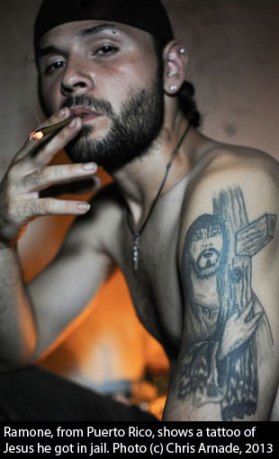 Aside from a few notorious individuals—Henry Ford, perhaps, or Bernie Madoff—few people get to experience life at society’s top and bottom. Chris Arnade is an exception. Two years ago, Arnade quit his job as a Wall Street trader to focus on a burgeoning hobby, photographing addicts and prostitutes in the Bronx neighborhood of Hunts Point. That’s where he spends most of his time now, following subjects into dirty pits under the expressway, or crashing for the night in a crack house.
Aside from a few notorious individuals—Henry Ford, perhaps, or Bernie Madoff—few people get to experience life at society’s top and bottom. Chris Arnade is an exception. Two years ago, Arnade quit his job as a Wall Street trader to focus on a burgeoning hobby, photographing addicts and prostitutes in the Bronx neighborhood of Hunts Point. That’s where he spends most of his time now, following subjects into dirty pits under the expressway, or crashing for the night in a crack house.
Arnade doesn’t want this story to be about him, though. He’d far rather focus on the people he’s befriended and photographed—people like Takeesha, a prostitute who was raped when she was eleven, and Wayne, a homeless scrap metal collector and addict who, despite his troubles, is always polite and gracious. Men and women who, born into other circumstances, could perhaps have made a decent life for themselves.
“Poverty and addiction have a thousand mothers, none of them sloth,” Arnade wrote in a recent op-ed piece in the British newspaper The Guardian . As he’s eager to point out, nobody chooses a life of poverty and daily hustling—which, contrary to popular perception, “is some of the hardest work around.”
So no, the story isn’t about him. Still, Arnade knows, the “quitting Wall Street to photograph junkies” line is intriguing, so he’s not completely averse to using it to publicize his work. “It’s a bit of a cheap story, but I also know it’s a gimmick that gains attention.”
What becomes clear when you talk to Arnade is that he was never the stereotypical Wall Street guy. He grew up in the South, with a father whose Civil Rights campaigning resulted in taunts and death threats against the family. A socially awkward math prodigy, Arnade initially loved the intellectual challenge of being a money man. “I found my sense of accomplishment when I was doing numbers,” he says.
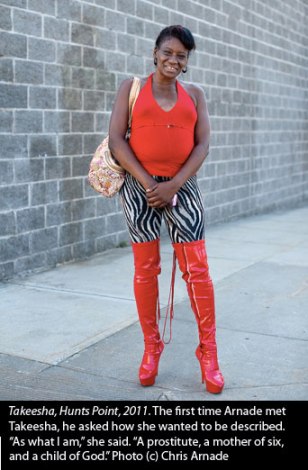 Things changed in 2008, when the recession hit and a shimmering curtain was lifted on Wall Street, revealing corruption and greed. Before, Arnade says, “I felt we weren’t doing a bad thing. We weren’t doing a
good
thing,
per se
, but it was benign.”
Things changed in 2008, when the recession hit and a shimmering curtain was lifted on Wall Street, revealing corruption and greed. Before, Arnade says, “I felt we weren’t doing a bad thing. We weren’t doing a
good
thing,
per se
, but it was benign.”
For several years before that, Arnade had been taking long walks around New York City on the weekend with his camera. One weekend, he got to Hunts Point—a desolate peninsula in the South Bronx, cut off from the rest of the city by an expressway and train tracks—and something coalesced. There he met people like Sonya, a former soccer mom turned heroin addict, and Michael (aka Shelley), who was disowned by his parents at fifteen for being gay. From those encounters, a sense of mission was born that has propelled him into a new career as photographer, writer and activist. On his flickr photostream and his tumblr site , Arnade publishes photographs and stories about a group of people he has come to think of as his friends; he has also been writing a series of searing op-eds for The Guardian .
Recently, Arnade spoke to The Literate Lens about the work, his subjects and his hopes for society.
Literate Lens: Were you in Hunts Point last night? It was SO cold.
Chris Arnade: Yes, and I’m in Hunts Point now. I spent the morning looking for a friend, I don’t know where she is, hopefully she’ll pop up. Usually she manages, but there’s always a risk she’ll pass out in the cold.
LL: That brings up the question of how involved you get with your subjects. You seem to get more involved than the average documentary photographer. How did you decide that, and is it hard?
CA: I’m lucky: if I was working for an institution I’d have guidelines, but I’m doing this work for myself. To me these people are my friends, and it’s no different from if you had a friend in need. The questions to consider are, how much influence do you think you have? Does the “help” you give actually help, or hurt? You can’t come in and tell someone they need to be saved: that’s massively presumptuous. If they ask for help I’ll help—I’ll give them a ride to detox or take them to McDonald’s and buy them dinner—but I’m not going to preach to them. The biggest thing I can do, as with any friend, is just listen, and see what that listening brings.
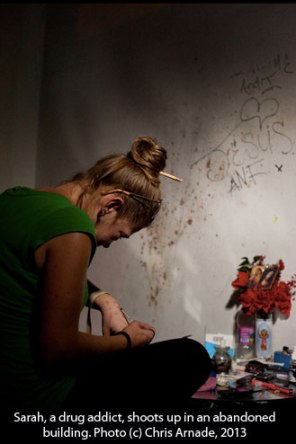 LL: How did this project get started?
LL: How did this project get started?
CA: In 2010, I came to Hunts Point for the first time on one of my ‘Terminus walks’ — I’d ride to the end of a subway line and walk around the neighborhood. Someone had said to me, Don’t go to Hunts Point, so of course I had to go there!
LL: What made you keep going back?
CA: Hunts Point is surrounded on all sides by water, train tracks and expressway, so it feels isolated from the rest of New York City. I grew up in a small town, and Hunts Point has a similar feeling. As soon as I got here, I felt very comfortable. After some time walking around, I got involved with the nonprofit Hunts Point Alliance for Children, and started coming almost every weekend with the camera. I liked spending time in the quieter, more desolate parts, where the addicts live—so it was only a matter of time before I started talking to them.
LL: How do you approach and befriend your subjects?
CA: I treat them like people, not pariahs or children. One thing I do is hug everyone out here—there are times I’ve come home covered in filth! People here are used to getting a fist-bump, that’s their maximum human contact. I try to treat them the same way I’d treat anyone else. It may sound arrogant of me, as a former Wall Street trader, to call them friends—but I truly see them as friends. I slept over at Takeesha’s apartment during the blizzard, I wasn’t getting any pictures out of it, it was just where I wanted to be.
LL: What’s your photography background, and how has it influenced the work?
CA: I’ve used cameras all my life. As a kid, I used to build my own cameras, and as a PhD candidate in Physics, I built cameras in optics labs. But the fact that I have no art school training has benefitted me, I think. If I’d been to art school, I might have felt compelled to do something more complex with the work. I just want to take conventional pictures of unconventional people.
LL: Is it advocacy?
CA: At some level, yes. I’m a political person, opinionated, and that comes into the work. By accident or whatever, I’ve spent a lot of time between two very different populations, the top one percent and the bottom one percent. At first, that was playing out in real time—I was going to work on Wall Street during the day and coming here at night. I knew the two populations very well, and it was frustrating to me to see how they could exist ten miles from each other and be so different in terms of what they owned, yet not so different in terms of skill sets and qualities. I do get mad at times, so there’s a sense of activism.
LL: A lot of notice you’ve gotten for this work has come from social media. What’s it been like to post these images and get immediate feedback?
CA: It’s a mixed bag. I get one or two emails a day from addicts and parents of addicts, saying things like, Thank you for letting me realize I never want to do drugs again, or, Thank you for helping me understand my mother. On the other hand, I’ve gotten a lot of remarkably negative feedback from people I thought would be more open-minded. I don’t know why they’re so angry. Mostly they say I’m exploiting the poor, which I think is absurd. They say it’s poverty porn—well, I wish there was more poverty porn, because there sure is enough luxury porn! As for exploitation—well, that’s working out really well for me. I’m earning no money, and I’m about to sell my house and move upstate so I can keep doing this.
LL: Along with the images, you post little vignettes of your subjects’ lives, which are really touching. Y ou’ve also collaborated with other writers to tell some of these stories. What do the words add?
CA: A lot! The worst piece of advice I was ever given was from a famous professional photographer: he told me the pictures should be able to stand on their own without words. I totally disagree! There’s only so much a picture can do. Maybe if my project was about melting icebergs or people with tattoo fetishes I’d need words less, because pictures can do justice to icebergs and tattoos. But my goal is to get people to look at a picture and then be drawn into a story. The words challenge our narratives about the poor, which—if you’re one of society’s winners—might be that they deserve their lot, they’re lazy and need to work harder. As I see it, the real story is that winning and losing is based on circumstances, not merit. And that’s a harder truth to live with.
LL: You’ve also been writing your own op-eds for The Guardian , many of them about issues of poverty and its root causes. What do you hope to accomplish with those?
CA: Well, I hope my Guardian pieces have gotten a few people to change their minds about policy. Economists and policy-makers are often so obsessed with GDP and growth that they ignore everything else. I worked with economists for a long time, and what was often missing from the equation was empathy.
LL: What’s the biggest thing you’ve learned from doing this work?
CA: That men suck. Seriously. Every single woman I work with out here has been raped by a man. They get abused and exploited on a daily basis.
LL: You didn’t know this before?
CA: Not to the extent I know it now.
LL: So how does it make you feel, as a man, to know this?
CA: Sad. My father was a civil rights activist, and right before he died, one of the last things he said to me was, vote for Hillary. I said, not for Obama? And he said no, men have messed the world up for long enough. And these days I think that’s about right.
LL: How else has this work changed you?
CA: Eight or nine years ago, I was an empiricist and an atheist. I thought the best way to live was to weigh every decision and find the best answer based on all the evidence. Now I think that science is good at building bridges; it’s not so good at building lives. I’d rather live a life of complication and irrationality. I think that’s what being human is!
————————————————————————-
See Chris Arnade’s Flickr photostream, with stories, here .
See Arnade’s tumblr site here .
Read Arnade’s op-eds for The Guardian here .
Listen to a story on Arnade on NPR’s Weekend Edition here .
78 comments on “ Bronx Tales: An Interview with Chris Arnade ”
Leave a Reply
Connecting to %s

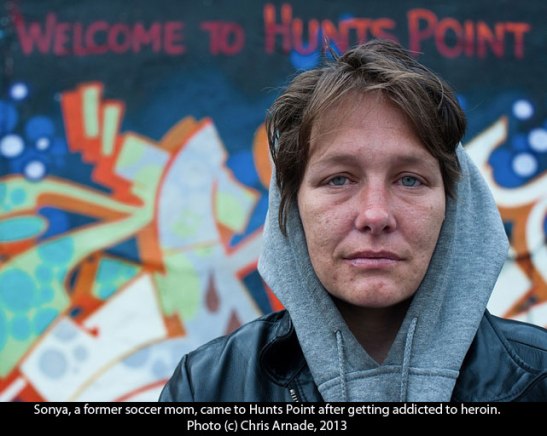
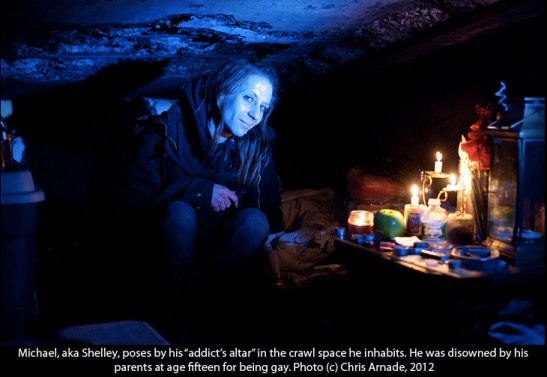
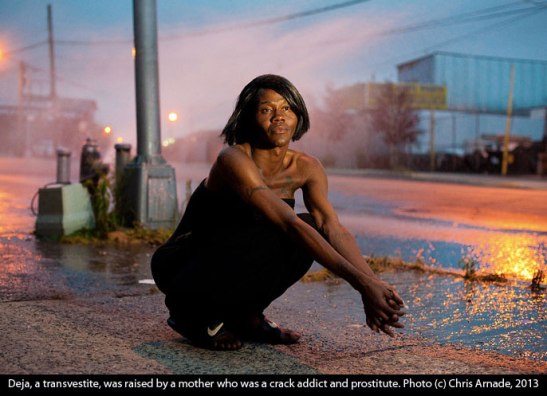
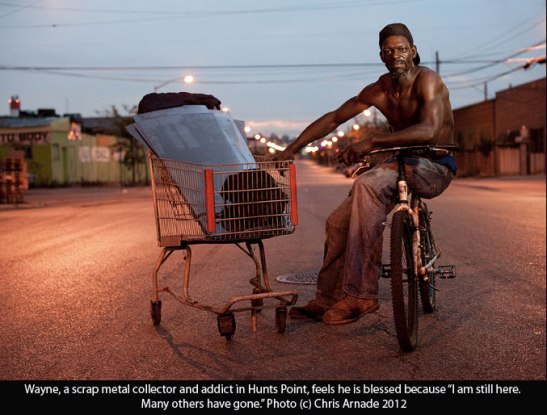
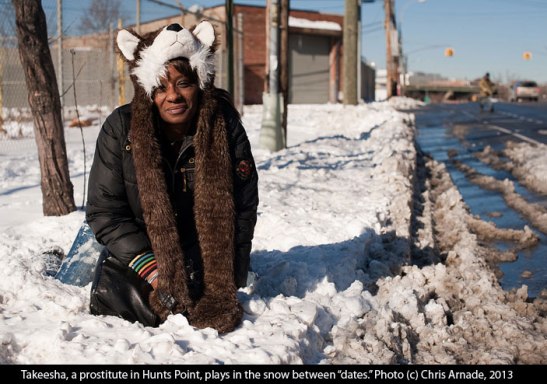
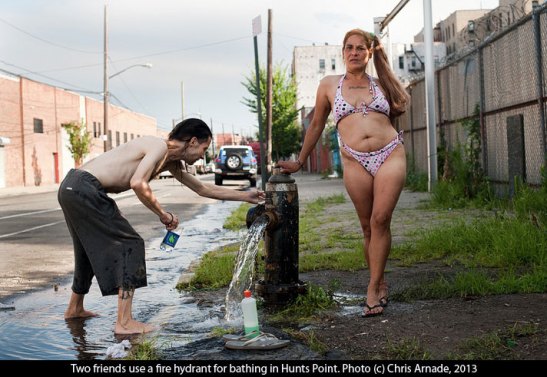
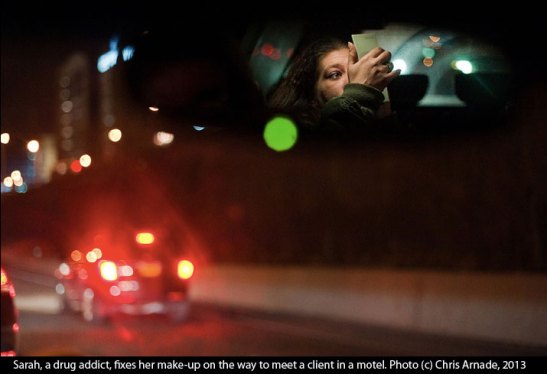

Strong work. Thanks for introducing me to it!
I’m supposed to be interested when a privileged white guy from an industry filled with psychopaths and awful people decides to joyride into the abyss for “art”. Work on Wall Street, get rich speculating at the expense of the rest of the planet, retire at 40 and pass your time taking pseudo-sensitive photographs of the same people the financial system left broke. Psychopathy is the key to success.
There are hundreds of thousands of people that are doing what he’s doing, but they didn’t have the connections or the privilege necessary to make this a story. Instead of interviewing him, go up to the South Bronx and do a special on a pastor that has to console these people every day, or a social worker that gets paid pennies to provide mental health services for people who have fallen off the radar. I do not understand why a rich guy becoming a saint for god knows why is somehow more important than anything else.
It’s like those stories you read about well off yuppies who leave the city to grow 20 acres of organic vegetables. Hello? There are people called “farmers” out there already.
Thanks for your comment, Lucent. I respectfully disagree. By interviewing Chris I’m not trying to say he’s more important than anything else—and I’m sure he’d cringe in horror at the suggestion. Also, I don’t think he’s taking a “joyride into the abyss”—unless you call selling his house and renting a room in a crack house joyriding. Chris is devoting his life to this work, and although it may be an ugly fact, if he can get some attention for being “the Wall Street guy who quit to take photographs of prostitutes” and it throws attention on his subjects, should he refuse that? Ethical purity is very fine, but sometimes it’s a luxury. Let’s not let the perfect become the enemy of the good.
His story is totally one dimensional. A wall street man develops a fascination with these people and begins to make art about them. Is this supposed to be a recuperative narrative? Where we as readers or listeners actually empathize more with his transformation, or enlightenment than with the subjects of his photos as he writes about himself and his transformation endlessly – “Omg there are poor people that do drugs!?!? I had no idea!?!”
Is his privilege merely being reproduced by this story here? Is the former atheist, physicist/financier redeemed by the faith of those who are truly disenfranchised by systemic racism, sexism and economic disparity? Is his prior participation in an economic system of alienation and abstraction somehow forgiven by simply becoming aware of the disparity and suffering in our society. In short, isn’t all still about him and not about his subjects at all?
True artists, especially photographers, don’t make themselves the focal point of their work. Name me one, just one national geographic photographer that probably produces some of the most amazing images known to man. I know you probably can’t name one, and you want to know why? Answer: Their work is not at all about them, and the subjects they photograph are the focal point. How/why is it I know more about him(his childhood, his Wallstreet days, basically everything) like his subjects? Is there a reason other than gaining attention for himself for the endless discussion of HIS beliefs, HIS discovering there are poor people, HIS discovering, omg, there are poor people who still believe in god and a million other really “aha” moments he had in realizing for the first time in his boring life that there are people on that live an existence entirely different from his.
Someone take Chris to a real third world country where people die left and right from not having access to the most basic needs like fresh water. Like I’m sure it will be revelatory and shocking to him as well, that he discovers that there are poor people worldwide suffering, but I’m sure there will article after article about himself, talking about himself, about how he had no idea.
We can agree to disagree on this.
It is much more than that–have you followed his work? He actually gives a s*&t about the people that cross his path. He values them, who most have felt no value. He helps them in whatever it is they need at the moment-sometimes just someone to lean their head on. He gives them a voice. How often do we walk past people who are wearing their problems on the outside and turn our heads and click our tongue–tsk tsk drug addict or get a job. He gives them a platform to share who they are-cry out to the world and for the rest of us to realize it’s so much more than what we think.
So before you jump on the white wallstreet guy, go really check out his work and then ask yourself what are YOU doing for the hurting, broken, voiceless that live among us all?
The shocking part of what he is doing is–it isnt in that third world country–it’s right here in the land of dreams–the good ol US of A
Interesting points put forward here, I see a lot of this in real life, privileged people who work in finance, make loads of money, then decide to open a restaurant or become a photographer, or open a yoga studio.
Powerful stuff. Thanks for sharing.
Lucent: Indeed! All I would say is that it is not Chris who is driving the media focus on HIS story, and I think he too is frustrated by it. In fact, at the end of our conversation (not included in the interview) I asked him if any publishers had approached him about doing a book. He told me that someone had approached him about writing HIS story, but that he wasn’t interested in that…
I, however, am always interested in how people come to do what they do, which is a part of my interviews with photographers on this site and elsewhere. And actually, I can name many NatGeo photographers (Jay Dickman, Catherine Karnow, Paul Nicklen, Steve McCurry), though I may be unusual in that regard.
Sarah
No need to defend me, but thanks.
Lucent
“Someone take Chris to a real third world country.”
A part of my bio that you haven’t read, is this. I lived one year in Nigeria, during the middle of their civil war, in 69. I spent one year in India in 74. I spent most of a year in Eastern Europe in 76, during Communism. I spent most of 80 in Southern Africa.
A great deal of my life has been spent in what you call “third world countries”
You have ideas for how art should be produced. Great. Do them, do them that way.
I have chosen to go down this path.
Yes, talk about yourself some more. Please let us more about you b/c I just don’t know enough!
Seriously, Chris, the last thing I want to read is more about you. I think the countless articles you have pumped out about yourself is sufficient and you are chastising me for knowing more and delving deeper into your personal narrative. You do see the irony in this? Right?
You are awesome. I love what you do and appreciate all that that entails. Contrary to popular belief, America has its own “third world country” and far too many people are in denial about that! Keep up the good work Chris, you have a huge following and you are loved!
I think it is awesome what you do, i am a recovering drug addict and alcoholic, i have been clean now for two years and six months. I am also a wife and mother of four. People need to have their eyes opened so they can see that the people they pass on the street and think of as nothing but trash, well these people have loved ones they are someone’s child probably someone’s parent, brother, sister they are no different then anyone else they are just lost
You are indeed different in that regard, as I bet if you asked 100 people less than 5% would be able to name one. Also, do you know the level of detail from their childhood, growing up, what happened in their adult life, that they have kids,etc? You don’t, and you want to know why? It’s bc what I wrote above.
And lastly, he is frustrated that the focus on him? Who is writing story, after story, after story ABOUT HIMSELF in The Guardian pieces about HIS beliefs, HIS transformation(ME ME ME ME ME ME ME). I would hope are able to realize by reviewing what he has written, the narrative is always about him as the focal point of anything he writes, and you actually believe it when he says he is frustrated by all the attention he is getting? Umm, ok, makes perfect sense.
Wow, that was quite an angry and perhaps misdirected rant, Lucent.
I have followed Chris’s work since fairly early in its development. While I don’t know Chris personally (I have never met him or spoke with him) one of the many things I have come to learn about him and from him, through his work, is that any reference to himself in his writing is generally in the form of perspective. I have never felt that he came off as a self serving type of person as you for some reason seem to judge him. I also believe at least one of many subtle and complex intentions of his work is to garner a little empathy (not sympathy) for people to have for one another. We are all human and each of us is as valid as another, despite some of us being lucky enough to be born with more social privileges and thus opportunity than others. When I mention privileges I don’t just mean that of income or race but also gender, sexuality, etc. There are many types of privilege that most of us are not conscious of and that lack of awareness I think is largely related to a general lack of empathy as well.
You really can’t stop hating, can you?
Knowing an artist’s background should interest you, because it shows you where someone is coming from, it allows for compassion to be felt towards them and the work they produce. The man has lived an incredibly fascinating life! What is your problem? He is so worldly, a very special characteristic in humanity; he wants you and me and everyone to know that people deserve the same regard and the same respect no matter who they are. This is translated in all of his work, and he is no better or no worse from the “pastor” and “social workers” you mentioned earlier. He simply goes about making a difference in another way. I’ve been following his work for over a year now and it is like no one else’s…simply put. He is the freaking MAN and yet all you can do is whine about how he shares stories about his life and himself. Maybe because you wish you could make an impact as meaningful as his?
It appears to me, Lucent, from all of your MANY posts that you are envious that it is not all about YOU, YOU, YOU, and you are trying very hard to make it so. Write your own articles. Then you can get the attention YOU seem to crave.
Powerful stories! I’d say, it’s best to do something, and help however you can – spread the word, bring attention to the issues, get help for this community, than sit around and do armchair philosophy. I don’t think this under-served community can be picky about who helps them out.
Chris, great photographs and stories! They remind me of the documentary “Dark Days.”
It’s funny to see that people WHO DON’T DO ANYTHING ARE ALWAYS READY TO JUDGE THE WORK OF OTHERS.
Keep up the good work Chris:)
Amazing stories you have brought forward. I drive through this area daily on my to work & almost all of it goes unnoticed.
It’s easy to criticize what you don’t do. I give you credit for what this post DOES accomplish – so many of us live blissfully unaware of the suffering right here, down the street form us. Great work here !
Yes! I’d also just like to say that I’ve interviewed many esteemed and respected documentary photographers in my life, and Chris is the real deal.
Made me nostalgic for the Bronx, we lived there in the 60s and 70s, I miss it a lot. Give my regards to Arthur Avenue:)
Wow this is extraordinary work. I live in Ghana and I’ve always wanted to visit New York. Television had shown me the glamorous side of the city, and also the not so decent part. But i never though it was real.After seeing this pictures i still want to visit New York because i feel it has so much to offer, the one difference is that i know really know that not all of its streets are filled with hone and milk. – Hakeem Adam
Thanks for your comment, Hakeem. I hope you get the chance to visit New York some day! It’s a complex, fascinating place.
You’re welcome 🙂
I’m side-stepping the drama up there..I like this photographer.. He’s not afraid to peel back the satin curtain that hangs on many people’s eyes so we can see the reality of our people. I choose street photography as well and have many shots of my “street people” whom I take the time to meet and know their history.. Yes, it’s easier to take a photo of a butterfly (no offense to naturist) but the real work is in confronting the dirt..
Nice interview and tell Chris, keep snapping those post cards!
🙂
Reblogged this on A Year on the Island .
Thanks!
That’s the way art should be done; not just made but Lived. Important work, too. He’s a man on a mission. Thanks for sharing.
You’re welcome!
Reblogged this on jadeyhamidon's Blog .
Thanks!
Your welcome ! ♡
Wow! You are a gift. A light. A voice in the desert.
I understand your heart. I pray that your photography raises awareness, and that as you walk among the ruins, you will also become part of the restoration. xoxo
Reblogged this on Ketchup Is Red! and commented:
Take a trip to the margins. The majority of us never do.
Thanks, Jason!
Beautiful photographs. I love photography, and recently went to an exhibition with my non-arty friend, a mixed exhibition as it was a photography award, and we both felt the way they displayed (no text and arranged specifically) misconstrued the point of some of the images. This makes me think; adding words like Chris has done seems crucial to these pictures as without it the people portrayed would lose some of their power. For me anyway. Without it you could put the image next to another photographers work and then maybe you could see as ‘poverty porn’ or whatever.
But I definitely think they are beautiful images that give the subjects a strong personality, and I don’t feel like they are made into victims in any manner. The opposite in fact. I think the images show us beautiful elements of the people that would be overlooked by most documentary photographers. The work gave me the similar nice feeling that ‘Her Story – Animata Freetown’ did by Jason Clarke; showing a poor woman, living in poverty, as a strong beautiful woman with power and strength. I love the one of Sarah in the wing mirror by the way – its my favourite!
Reblogged this on Tarek Elbakry's Blog .
Thanks!
Great blog post and thanks for bringing attention to the forgotten neighborhood of Hunts Point. From this New Yorker — there aren’t many that would step into Chris Arnade’s shoes here.
Wow. I thought this work might be about voyerism, but it is really about the feeling that “There but for fortune, go you or I, you or I” (song: Blowing in the Wind by Bob Dylan)
Indeed!
This is a bleak reminder of what needs to be done here in the US to improve the lives of people society has left behind.
Congrats Sarah on a meaningful interview that brings the art and the artist off the page!
Chris, your work is incredible!
Thank you!
Reblogged this on Kristine O"Reilly .
Wow this is heavy. Beautifully done!
Reblogged this on The International Blogspaper .
Reblogged this on maha's place .
photographing drug addicts, and making it into art – the camera makes the addict look beautiful, but reality the addicts life is pain – pain turned into art
…as is so much art, jai3! Thanks for your comment.
Reblogged this on joycefleming222 .
Poignant and positive work!
nice article!
http://www.dryguywaterproofing.com
Thanks! Appreciate it.
Reblogged this on Eu. Sunt. Liber. .
Reblogged this on PROFESSIONAL OPTIMISTIC .
Great, thanks!
I loved your article, eye opening and powerful
Thank you! It’s been rewarding to feature Chris’s powerful work and get such a good response.
Thanks for reading and responding!
Thank you for your article. It was quite an eye opener. I truly believe that he is friends with these people. Even if I didn’t, I sure am glad someone is there to lend a hand in helping out. Rich or poor, happy or sad – no matter the reason, Chris is helping out.
Great work your doing!! But what is sad is that you are out there helping people that most people think can’t be helped,then by no means of yours you happen to get a little of attention from it,then you have people attacking you and your motives. Its seems crazy to me that someone could look at what your doing and only focus on what you’re getting out of it. There was a constant theme in these posts ,that you’re talking about yourself, but all of this persons posts are totally obsessed with talking about you. He baits you with questioning your life and what you have done, then as soon as you answer his questions he says, there you go again talking about yourself. Wow, he’s so transparent. Anyways what your doing is good and it really doesn’t matter how your doing it. You’re getting people to see what life can really look like and that it can happen to anyone. Nobody is immune to addiction. Addiction only ends in one way and your showing people what it looks like on the way to that ending. Its not pretty ,but it always ends in death. Keep up the good work!!
Oh and thank you Sarah for taking the time to get an interview with Chris. The only way anybody would ever know about his work is by people like you getting this out there to the people. New York City needs to see what this little hidden area of their city looks like. Chris is showing us and you’re putting it into words. Thanks I’m looking forward to more articles and more pictures.
Thanks, mimis72! You make good points.
Reblogged this on Wedding Photographer Sydney .
Thanks!
Reblogged this on TGM .
Great, thanks!
Reblogged this on Grez Suziö .
Great piece. Keep up the good work!
Thanks for reading and reblogging, Grez!
Reblogged this on cynthiadasilvarocha .
Thanks Sarah without you I would never have found out about this very interesting photographer. I think Lewis Hine was a schoolteacher when he started his treks to Ellis Island — not exactly the same as an investment banker but I suppose a similar desire to get of the island and photograph people in limit situations.
Hi Graham, Thanks for reading. Lewis Hine was a lifelong Progressive, so not sure about that analogy, but there are others who’ve left stable careers (though perhaps not as well-paid as Wall Street) to become photographers. Can’t think of names offhand, but I know I’ve interviewed photographers who were once something else. And let’s not forget that William Henry Fox Talbot, one of the first inventors of photography, was a member of the landed classes who didn’t need any kind of income from work.